In this article:
Negligence and delay in addressing obvious signs of gum inflammation right from the onset pave the way for advanced gum diseases such as periodontitis, a condition known to cause tooth loss.

Thus, it is imperative that you pay concerted attention to your oral health and proactively treat issues such as gum swelling to reverse the damage.
Treating Gum Swelling at Home
Here are 10 home remedies to reduce gum swelling.
1. Use warm and cold compresses
Warm and cold compresses can provide quick relief for sore, swollen gums as they help reduce pain and swelling. You need to hold the compresses against your face, not directly on the swollen gums. (1)(2)
How to use:
- Soak a clean cloth in warm water and wring out the excess liquid.
- Hold the cloth against your face for 5 minutes.
- Next, wrap a bag of frozen peas in a thin towel and hold it against your face until the area becomes slightly numb.
- Repeat the cycle two or three more times.
- Use this remedy as needed.
Always consult your dentist when you notice an abnormal swelling.
2. Salt water can give you easy relief
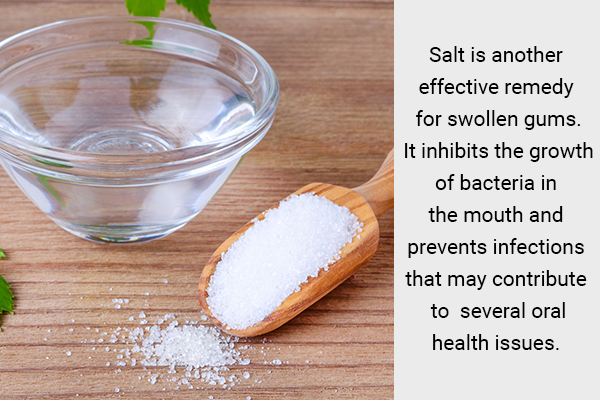
Salt is another effective remedy for swollen gums. It inhibits the growth of bacteria in the mouth and prevents infections that may contribute to several oral health issues.
A 2016 study published in PLOS One found that the use of salt solution as a mouth rinse, in conjunction with routine oral care, promotes oral wound healing. (3)
Another 2016 study published in Neonatal and Pediatric Medicine found that salt water works as an astringent to expedite wound healing by reducing inflammation and contracting the tissues, thereby proving considerably effective for recuperation from periodontal wounds. (4)
How to use:
- After brushing your teeth with a soft-bristled toothbrush, gently rub your gums with salt for a few seconds. Rinse it off with warm water. Do this once daily. Even after your gums have recovered completely, continue following this technique at least three times a week to prevent recurrence.
- Another option is to add a ½ to 1 teaspoon of salt to a glass of lukewarm water and use it to rinse your mouth twice daily until the swelling subsides.
3. Fight germs using hydrogen peroxide
Hydrogen peroxide can also help reduce gum inflammation and pain. It can even help kill germs and fight oral problems. For oral health, use food-grade 3% hydrogen peroxide solution only.
A 2016 study published in the Journal of International Society of Preventive & Community Dentistry found that H2O2 concentration higher than 0.1% has been shown to possess a wide spectrum of antimicrobial activity.
Mouthwashes containing H2O2 significantly reduced the gingival index and enhanced wound healing following gingival surgery. (5)
How to use:
- Mix equal parts of 3% hydrogen peroxide solution and water. Swish the solution in your mouth for 30 seconds such that it washes over your gums and teeth. Rinse it off with warm water.
- Mix 1 teaspoon of baking soda with enough hydrogen peroxide to make a paste. Rub this paste on your gums, wait for 1 minute, and then rinse your mouth thoroughly with water.
- Use either of these treatments two or three times a week.
Note: Make sure you do not swallow hydrogen peroxide.
4. Apply turmeric paste to the affected area
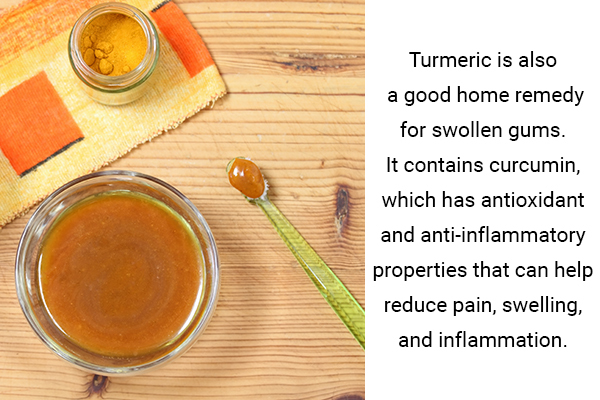
Turmeric is also a good home remedy for swollen gums. It contains curcumin, which has antioxidant and anti-inflammatory properties that can help reduce pain, swelling, and inflammation.
In addition, it prevents the spread of bacterial activity that causes several oral problems. (6)
How to use:
- Mix 1 teaspoon of turmeric powder with a ½ tsp of salt and a ½ tsp of mustard oil to make a paste.
- Apply this paste on the gums with your clean finger.
- Rub the teeth and gums with this paste twice daily.
- Rinse your mouth with warm water.
- Repeat this twice daily for 1 to 2 weeks.
5. Try lemongrass oil mouthwash
Enriched with vitamin A, C, and E, lemongrass oil is a therapeutic oil with much potential.
This oil has been known to possess analgesic, antimicrobial, antidepressant, antiseptic, antipyretic, bactericidal, astringent, deodorant, fungicidal, nervine, and sedative properties. Its aroma is citrusy fresh and adds a lot to the health benefits. (7)
A 2014 study published in the Libyan Journal of Medicine found that oral and topical application of lemongrass oil showed significant anti-inflammatory and antifungal effects on a mouse model. (8)
Another 2015 study published in the Journal of Clinical and Diagnostic Research found that lemongrass oil mouthwash demonstrated antiplaque and antigingivitis activity and therefore could effectively be used as a good herbal alternative to chlorhexidine mouthwash. (9)
To use a lemongrass mouthwash:
- Dilute 2 to 3 drops of lemongrass essential oil in 1 cup of water.
- Swish the solution in your mouth for up to 1 minute.
- Spit out the solution.
- Repeat this two to three times per day.
Note: Lemongrass oil is generally safe to use, but it should always be diluted appropriately before use to avoid any side effects.
6. Use aloe vera gel to soothe the gums
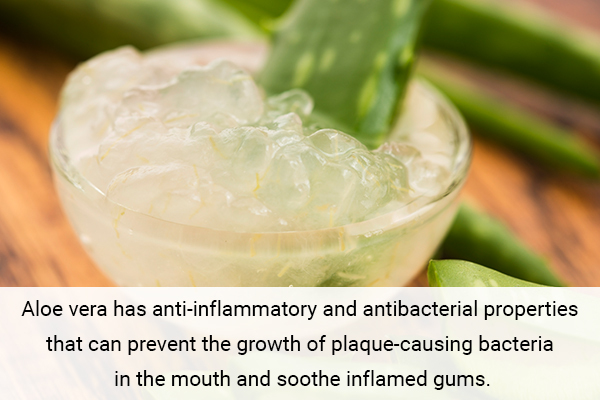
Another effective remedy to treat swollen and bleeding gums is aloe vera. This herb has anti-inflammatory and antibacterial properties that can prevent the growth of plaque-causing bacteria in the mouth and soothe inflamed gums. (10)(11)
How to use:
- Cut open an aloe vera leaf and scoop out the gel.
- With a clean finger, rub the gel on your gums.
- Gently massage your gums for 1 to 2 minutes.
- Rinse it off with warm water.
- Repeat a few times daily until there is an improvement in your condition.
7. Ease discomfort with tea tree oil
Tea tree oil has antibiotic and anti-inflammatory properties that can help provide timely relief from irritated and inflamed gums. (12)(13)
However, this natural remedy alone cannot suffice as a complete treatment and must be used in conjugation with professionally administered scaling and root planning sessions for maximum benefits.
A 2004 study published in Oral Microbiology and Immunology showed that tea tree oil exhibited strong antibacterial activity against periodontopathic and cariogenic bacteria. (14)
How to use:
- Mix a few drops of tea tree oil in a glass of warm water. Use it as a mouthwash twice daily.
- Brush your teeth with a toothpaste containing tea tree oil as the main ingredient to ease discomfort.
Follow these remedies daily until your gums look healthy again.
Note: Make sure not to swallow tea tree oil as it can cause stomach problems.
8. Oil pulling technique
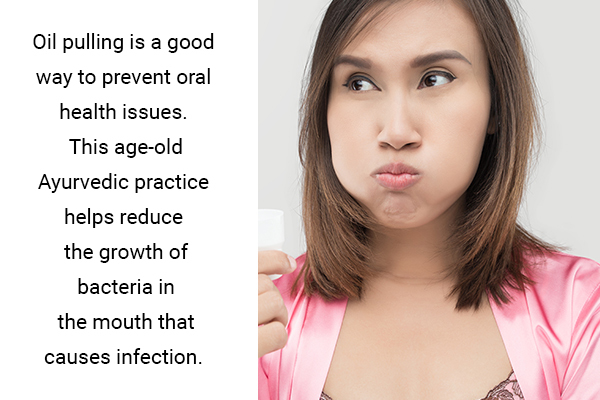
Whether it is inflamed gums or any other dental problem, oil pulling is a good way to prevent oral health issues. This age-old Ayurvedic practice helps reduce the growth of bacteria in the mouth that causes infection. It even prevents plaque formation and strengthens the gums. (15)
A 2017 study published in the Journal of Traditional and Complementary Medicine highlighted the efficacy of incorporating the oil pulling technique into your routine oral hygiene regimen as a complementary method to further enhance your dental health. This method, when practiced correctly and regularly, can bear considerable positive results. (16)
How to use:
- Put 1 tablespoon of sesame oil in your mouth.
- Swish the oil in your mouth for 15 to 20 minutes.
- Spit out the oil, and then rinse your mouth thoroughly with warm water.
- Finally, brush your teeth.
- Do this daily in the morning before brushing your teeth.
Note: Do not gargle or swallow the oil. Also, be sure to spit the oil out in a trash bin rather than your basin as it can cause clogging of the pipes.
9. Up your vitamin D intake
If you are prone to the problem of swollen gums, increasing your intake of vitamin D can be especially beneficial in ridding yourself of this condition. Vitamin D has anti-inflammatory properties that help reduce swelling and prevent it from recurring.
Vitamin D also helps the body make full use of the calcium from your diet, thus improving periodontal health and increasing bone mineral density.
A 2017 study published in the Journal of Oral Research and Review further supported the claim that vitamin D supplementation has a mitigating effect on bone destruction and inflammation and, therefore, can be useful in reducing and preventing tooth decay on account of periodontal diseases in deficient patients. (17)
How to consume:
- Help your body make vitamin D by exposing yourself to early morning sunlight for about 10 minutes daily.
- Eat vitamin D-rich foods such as salmon, whole eggs, sunflower seeds, and cod liver oil.
- You can opt to take a supplement, after consulting your doctor.
Note: High doses of calcium are not recommended, and any supplementation should always be started after running it by your GP first.
Be extra cautious if you are pregnant or breastfeeding or if you suffer from atherosclerosis or kidney diseases as supplements can interfere with your medication and give rise to serious complications.
10. Take proper nutrients
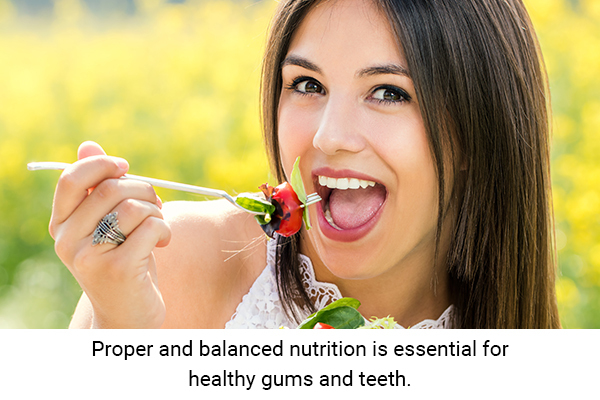
Proper and balanced nutrition is essential for healthy gums and teeth. Make sure you get adequate amounts of calcium, vitamin C, and folic acid from your diet to prevent swollen gums, especially because inflamed gums are often rooted in a deficiency of any of these elements. (18)(19)
- Eat vitamin C-rich foods, such as oranges, strawberries, kiwi, pineapple, bell peppers, broccoli, Brussels sprouts, cantaloupe, and kale.
- Eat calcium-rich foods, such as dairy products, sardines, tofu, salmon, soy milk, cereals, and collard greens.
- Eat foods with high levels of folic acid, such as dark leafy greens, broccoli, asparagus, peas, beans, lentils, and avocados.
- If needed, you can take supplements, but only after consulting your doctor.
Preventing Gum Swelling
- Follow a regular and appropriate oral hygiene regimen that involves brushing twice daily and flossing once a day. Do this with a light but steady hand, to avoid applying undue pressure on the gums. Also, brushing your teeth in circular motions instead of the back-and-forth motion is recommended. While flossing, gently move the thread up and down following the curve of the tooth.
- You can even try an electric toothbrush as it has been found more efficient with plaque removal.
- An antiseptic mouthwash is a good and effective value addition to your oral hygiene regimen, as it helps to eradicate the inflammation-causing bacteria in the mouth.
- If you notice that the swelling in your gums followed in the footsteps of a medication that you have only recently started taking, the former could very well be the side effect of the latter. Consult your doctor for a suitable alternative to the drug.
- Up your intake of fruits and vegetables rich in vitamins C and B, and follow a well-rounded diet in general.
- Drink plenty of water throughout the day to stimulate the production of saliva, which naturally helps kill bacteria. Also, drinking water after meals can help rinse your teeth and gums off food remnants and reduces the chance of plaque accumulation.
- Minimize alcohol consumption as it can exacerbate the damaging effect.
- Manage your stress levels, as stress leads to a spike in the cortisol hormone levels in the body and inflammation often follows suit.
Additional Tips to Reduce Gum Swelling
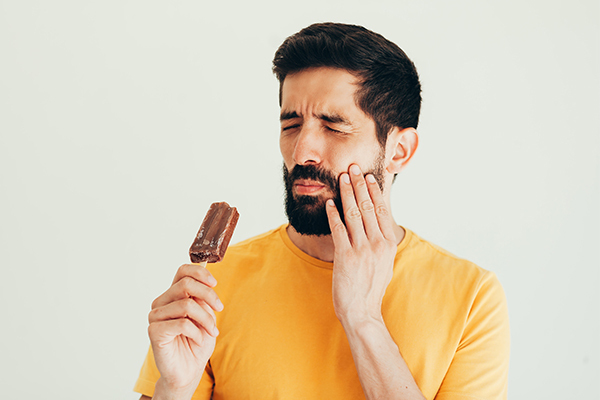
- Replace your toothbrush every three months and use only soft-bristled toothbrushes.
- Avoid very hot or very cold food and beverages.
- Visit your dentist at least once every six months for a checkup and professional plaque removal.
Final Word
Besides the standard brushing and flossing, it will serve you well to follow another foundational rule in the oral hygiene book: get regular dental checkups by a professional to catch and reverse any sign of oral disease in its nascent stages!
You can soothe the pain and swelling of your gums with proper oral hygiene and home remedies. However, if you have swollen gums and symptoms persist for more than 2 weeks, see your dentist.

- Was this article helpful?
- YES, THANKS!NOT REALLY



